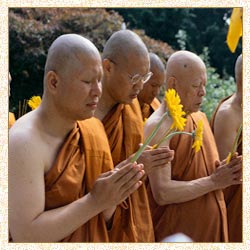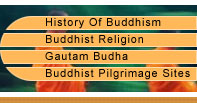 Theravada literally means 'The Way of the Elders'. This term embodies the entire sect in itself, as Theravada Buddhism is based on the original beliefs and practices of the Buddha and the early monastic Elders. Also known as Hinayana Buddhism, it is mainly predominant in southern Asia, especially in Sri Lanka, Myanmar (Burma), Thailand, Cambodia and Laos. Just like Mahayana, Theravada is also based on the Pali Canon, which comprises of an early Indian collection of the Buddha's teachings. Read on this guide further to know more about Theravada Buddhism...
Theravada literally means 'The Way of the Elders'. This term embodies the entire sect in itself, as Theravada Buddhism is based on the original beliefs and practices of the Buddha and the early monastic Elders. Also known as Hinayana Buddhism, it is mainly predominant in southern Asia, especially in Sri Lanka, Myanmar (Burma), Thailand, Cambodia and Laos. Just like Mahayana, Theravada is also based on the Pali Canon, which comprises of an early Indian collection of the Buddha's teachings. Read on this guide further to know more about Theravada Buddhism...Theravada Buddhists have a sole purpose in life, which is to become an arhat. Arhat is the name given to a saint who has reached nirvana and will not be born again. For this, they follow a rigorous austere existence and renounce the world. As per Theravada or the 'Lesser Vehicle', a layman can never ever achieve nirvana. There are the following four stages through which a Theravada Buddhist can become an arhat:
Sotapanna (Stream-enterer)
Sotapanna is the stage where the person is a convert. To attain this stage, he has to triumph over the false beliefs.
Sakadagamin (Once-returner)
The stage of Sakadagamin is that of being reborn again. It can be achieved by conquering lust, hatred and illusion.
Anagamin (Never-returner)
The stage of being reborn in heaven is known as Anagamin. It is the stage where he becomes an arahant.
Arhat (Worthy one)
The last stage is known as Arhat. Here, the person has attained perfect enlightenment and will never be born again.




